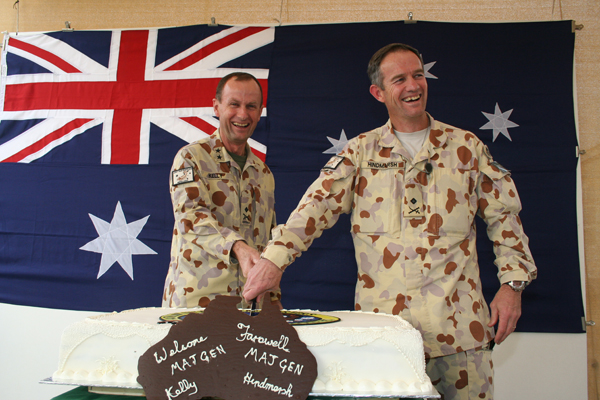|
Major General Mark Kelly, AO, DSC. |
|
|
|
Allocated to the Royal Australian Infantry Corps, he was posted to the 5th/7th Battalion, Royal Australian Regiment. Mark's first operational deployment occurred when he served with the Commonwealth Monitoring Force in Rhodesia (Zimbabwe) during the Independence elections in 1979–80. Mark served as the exchange instructor at the British Army's School of Infantry at Warminster from September 1985 to November 1987. On promotion to Major, he commanded a Rifle Company in the 1st Battalion, Royal Australian Regiment from January 1988 until December 1989.
He attended the Army Command and Staff College in 1990 and then served as the Brigade Major of 3rd Brigade from January 1991 until December 1992. He was promoted to Lieutenant Colonel in January 1993 and served in staff appointments in Army Headquarters until December 1995. He also completed a Master of Arts in Defence Studies from the University of New South Wales in 1995.
From December 1995 to December 1997, Mark was Commanding Officer of the 1st Battalion, Royal Australian Regiment. He then moved on promotion to Colonel to Headquarters 1st Division and the Deployable Joint Force Headquarters (DJFHQ) as the Chief of Staff, a posting that involved deploying the headquarters to East Timor for Operation Stabilise, where he served as the Chief of Staff of INTERFET. Mark was appointed a Member of the Order of Australia in the Australia Day Honour's List of 2000 for his "exceptional service to the Australian Army" as CO 1 RAR and COFS 1st Division. He attended the Centre for Defence and Strategic Studies at the Australian Defence College in Canberra in 2000.
Mark was promoted to Brigadier, and appointed to command the 3rd Brigade, Ready Deployment Force from December 2000 until December 2002. He was then posted to Headquarters United States Central Command (USCENTCOM) in Tampa, Florida, serving as the first Director of the Combined Planning Group (CPG), planning operations for Operation Enduring Freedom (OEF) in Afghanistan and the Horn of Africa, and Operation Iraqi Freedom (OIF) in Iraq. He was appointed an Officer of the United States Legion of Merit for his exceptional service in that appointment.
Promoted to Major General, Mark assumed command of the 1st Division and the Deployable Joint Force Headquarters (DJFHQ) on 5 July 2004. He then assumed the appointment of Land Commander Australia (LCAUST) on 15 July 2005 and served in that role until December 2008. In the Australia Day Honour's List of 2008, Mark was appointed an Officer of the Order of Australia "for distinguished service to the Australian Army in the fields of training, personnel and operations, in particular as the Commander of the 1st Division and as the Land Commander Australia."
In an official ceremony on 12 January 2009, Mark succeeded Major General Mike Hindmarsh as Commander Joint Task Force 633 (JTF 633); in this position he commanded all Australian forces in the Middle East Area of Operations (MEAO) and Afghanistan for a period of 12 months (Operations CATALYST, SLIPPER and KRUGER). He relinquished command of JTF 633 to Major General John Cantwell on 14 January 2010. Mark was awarded the Distinguished Service Cross in the 2011 Australia Day Honours List for his "distinguished leadership, exceptional professionalism and unwavering dedication in an extremely ambiguous and dangerous operational environment" as Commander Joint Task Force 633. Mark was transferred to the Army's Standby Reserve on 5 June 2010.
|
